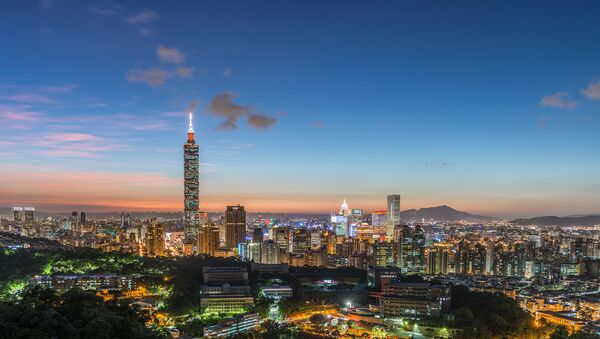"I urge our Taiwanese friends to continue to work hard in your fields to contribute to the realization of the Chinese dream as soon as possible. The Chinese dream is also the dream of the people on both sides of the Taiwan Strait – our dream of reunification," said Li Jiafan, a senior Chinese Communist Party official at a meeting with Taiwanese business people in the southern Chinese city of Shenzhen, as quoted by Reuters.
The media outlet notes that China is making every effort to establish close and mutually beneficial ties with Taiwan, split by the civil war from the country more than 60 years ago. The United Front Work Department, the Communist Party's Central Committee's organ, is playing the leading role in orchestrating the process of bolstering Sino-Taiwan relations.
The United Front is working at different layers of the Taiwanese society, carrying out business, social and educational programs. According to Reuters, "it is targeting academics, students, war veterans, doctors and local leaders in Taiwan." The programs are aimed at demonstrating China's goodwill toward Taiwan and softening the people’s stance towards the Communist party.
Hong Kong's accession to China serves as a model for the possible future reunification of the two political entities. The "one country- two systems" model gives the residents of Hong Kong certain freedoms and opportunities within the Chinese state. Experts note that the system has largely proved effective, pointing to the steady growth of Hong Kong's economy and the fact that the notorious "Umbrella Revolution," initiated by the Occupy Central activists has obviously failed to involve Hong Kong's society into confrontation with the mainland.
It should be noted that Taiwan's economy is deeply integrated and interconnected with the economy of China: "about 40 percent of Taiwan's exports are to China," Reuters notes, adding that "some key sectors like technology have much of their manufacturing on the mainland."
In order to boost economic and political ties with Taiwan, China has created a "friendly business environment" for Taiwanese businessmen, working on the mainland. According to the United Front 2013 report, about 30,000 Taiwanese business people and their families were living in China's Zhejiang province, with 6,800 Taiwanese enterprises operating there in 2012.
The United Front is organizing special tours to the mainland for Taiwan's military veterans and students. "Before the trips, I kind of resisted the idea of China. But through the programs I got to know them better and that resistance gradually disappeared," said Tsai Ting Yu, a 15-year-old junior high school student as quoted by Reuters.
Although the Western media and some Taiwan officials are beating the drums about China's alleged intention to "swallow" the island, there are Taiwanese who openly support the idea of reunification. Those who adhere to the middle ground warn against overstating the "negative" role of China's United Front.
"China has some political intentions. But Taiwan has its own advantages in terms of systems, core values and soft power. All of these, we hope, will impact China via exchanges," said Wu Mei-hung, Taiwan's Mainland Affairs Council spokesperson, insisting that United Front's work should not be assessed in an "overly negative way."
It should be noted that China's President Xi Jinping has already demonstrated his high level skills at using "soft power," competing with the US, renowned for its widespread "soft" leadership. The BBC cited China's leader in July 2014 as saying: "China does not subscribe to the notion that a country is bound to seek hegemony when it grows in strength. Hegemony or militarism is not in the genes of the Chinese. China will unswervingly pursue peaceful development because it is good for China, good for Asia and good for the world."
On November 22, 2014, Xi Jinping held a meeting with the representatives of the Pacific Island Countries in Beijing, declaring that "all countries are equal members of the international community irrespective of their size, strength and wealth, and they should respect each other, treat each other on an equal footing and help each other with sincerity," Xinhua reported.
China's foreign policy course correlates with Sun Tzu's famous postulate from “The Art of War’: "To attack the heart is the best. To attack a [walled] city is the worst," comments Reuters.



